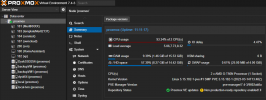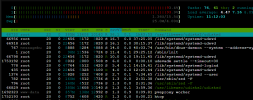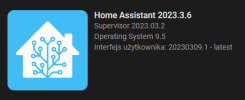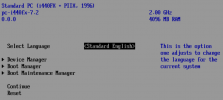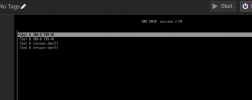I have a pfsense vm that wont boot. And I dont getting much in the logs on why that can be. Where can I look for the reason? In syslog I get this:
Code:
Mar 26 00:14:03 pve pvestatd[2084]: VM 100 qmp command failed - VM 100 qmp command 'query-proxmox-support' failed - unable to connect to VM 100 qmp socket - timeout after 51 retries
Mar 26 00:14:03 pve pvestatd[2084]: status update time (8.098 seconds)
Mar 26 00:14:04 pve pve-guests[2222]: start failed: command '/usr/bin/kvm -id 100 -name 'pfSense,debug-threads=on' -no-shutdown -chardev 'socket,id=qmp,path=/var/run/qemu-server/100.qmp,server=on,wait=off' -mon 'chardev=qmp,mode=control' -chardev 'socket,id=qmp-event,path=/var/run/qmeventd.sock,reconnect=5' -mon 'chardev=qmp-event,mode=control' -pidfile /var/run/qemu-server/100.pid -daemonize -smbios 'type=1,uuid=fd4b60d9-bdea-4d8b-a019-928bd74e0963' -smp '4,sockets=1,cores=4,maxcpus=4' -nodefaults -boot 'menu=on,strict=on,reboot-timeout=1000,splash=/usr/share/qemu-server/bootsplash.jpg' -vnc 'unix:/var/run/qemu-server/100.vnc,password=on' -cpu kvm64,enforce,+kvm_pv_eoi,+kvm_pv_unhalt,+lahf_lm,+sep -m 8192 -object 'iothread,id=iothread-virtioscsi0' -device 'pci-bridge,id=pci.1,chassis_nr=1,bus=pci.0,addr=0x1e' -device 'pci-bridge,id=pci.2,chassis_nr=2,bus=pci.0,addr=0x1f' -device 'pci-bridge,id=pci.3,chassis_nr=3,bus=pci.0,addr=0x5' -device 'vmgenid,guid=5a394dca-b1ee-4081-852c-b0bca72bda4a' -device 'piix3-usb-uhci,id=uhci,bus=pci.0,addr=0x1.0x2' -device 'qxl-vga,id=vga,max_outputs=4,bus=pci.0,addr=0x2' -device 'virtio-serial,id=spice,bus=pci.0,addr=0x9' -chardev 'spicevmc,id=vdagent,name=vdagent' -device 'virtserialport,chardev=vdagent,name=com.redhat.spice.0' -spice 'tls-port=61000,addr=127.0.0.1,tls-ciphers=HIGH,seamless-migration=on' -device 'virtio-balloon-pci,id=balloon0,bus=pci.0,addr=0x3,free-page-reporting=on' -iscsi 'initiator-name=iqn.1993-08.org.debian:01:614434bd2755' -device 'virtio-scsi-pci,id=virtioscsi0,bus=pci.3,addr=0x1,iothread=iothread-virtioscsi0' -drive 'file=/dev/zvol/rpool/data/vm-100-disk-0,if=none,id=drive-scsi0,format=raw,cache=none,aio=io_uring,detect-zeroes=on' -device 'scsi-hd,bus=virtioscsi0.0,channel=0,scsi-id=0,lun=0,drive=drive-scsi0,id=scsi0,bootindex=100' -netdev 'type=tap,id=net0,ifname=tap100i0,script=/var/lib/qemu-server/pve-bridge,downscript=/var/lib/qemu-server/pve-bridgedown,vhost=on' -device 'virtio-net-pci,mac=6A:8F:AD:DB:4E:31,netdev=net0,bus=pci.0,addr=0x12,id=net0,rx_queue_size=1024,tx_queue_size=1024' -netdev 'type=tap,id=net5,ifname=tap100i5,script=/var/lib/qemu-server/pve-bridge,downscript=/var/lib/qemu-server/pve-bridgedown,vhost=on' -device 'virtio-net-pci,mac=AE:8A:AE:B7:00:91,netdev=net5,bus=pci.0,addr=0x17,id=net5,rx_queue_size=1024,tx_queue_size=1024' -machine 'type=pc+pve0'' failed: got timeout
Mar 26 00:14:04 pve pvesh[2182]: Starting VM 100 failed: start failed: command '/usr/bin/kvm -id 100 -name 'pfSense,debug-threads=on' -no-shutdown -chardev 'socket,id=qmp,path=/var/run/qemu-server/100.qmp,server=on,wait=off' -mon 'chardev=qmp,mode=control' -chardev 'socket,id=qmp-event,path=/var/run/qmeventd.sock,reconnect=5' -mon 'chardev=qmp-event,mode=control' -pidfile /var/run/qemu-server/100.pid -daemonize -smbios 'type=1,uuid=fd4b60d9-bdea-4d8b-a019-928bd74e0963' -smp '4,sockets=1,cores=4,maxcpus=4' -nodefaults -boot 'menu=on,strict=on,reboot-timeout=1000,splash=/usr/share/qemu-server/bootsplash.jpg' -vnc 'unix:/var/run/qemu-server/100.vnc,password=on' -cpu kvm64,enforce,+kvm_pv_eoi,+kvm_pv_unhalt,+lahf_lm,+sep -m 8192 -object 'iothread,id=iothread-virtioscsi0' -device 'pci-bridge,id=pci.1,chassis_nr=1,bus=pci.0,addr=0x1e' -device 'pci-bridge,id=pci.2,chassis_nr=2,bus=pci.0,addr=0x1f' -device 'pci-bridge,id=pci.3,chassis_nr=3,bus=pci.0,addr=0x5' -device 'vmgenid,guid=5a394dca-b1ee-4081-852c-b0bca72bda4a' -device 'piix3-usb-uhci,id=uhci,bus=pci.0,addr=0x1.0x2' -device 'qxl-vga,id=vga,max_outputs=4,bus=pci.0,addr=0x2' -device 'virtio-serial,id=spice,bus=pci.0,addr=0x9' -chardev 'spicevmc,id=vdagent,name=vdagent' -device 'virtserialport,chardev=vdagent,name=com.redhat.spice.0' -spice 'tls-port=61000,addr=127.0.0.1,tls-ciphers=HIGH,seamless-migration=on' -device 'virtio-balloon-pci,id=balloon0,bus=pci.0,addr=0x3,free-page-reporting=on' -iscsi 'initiator-name=iqn.1993-08.org.debian:01:614434bd2755' -device 'virtio-scsi-pci,id=virtioscsi0,bus=pci.3,addr=0x1,iothread=iothread-virtioscsi0' -drive 'file=/dev/zvol/rpool/data/vm-100-disk-0,if=none,id=drive-scsi0,format=raw,cache=none,aio=io_uring,detect-zeroes=on' -device 'scsi-hd,bus=virtioscsi0.0,channel=0,scsi-id=0,lun=0,drive=drive-scsi0,id=scsi0,bootindex=100' -netdev 'type=tap,id=net0,ifname=tap100i0,script=/var/lib/qemu-server/pve-bridge,downscript=/var/lib/qemu-server/pve-bridgedown,vhost=on' -device 'virtio-net-pci,mac=6A:8F:AD:DB:4E:31,netdev=net0,bus=pci.0,addr=0x12,id=net0,rx_queue_size=1024,tx_queue_size=1024' -netdev 'type=tap,id=net5,ifname=tap100i5,script=/var/lib/qemu-server/pve-bridge,downscript=/var/lib/qemu-server/pve-bridgedown,vhost=on' -device 'virtio-net-pci,mac=AE:8A:AE:B7:00:91,netdev=net5,bus=pci.0,addr=0x17,id=net5,rx_queue_size=1024,tx_queue_size=1024' -machine 'type=pc+pve0'' failed: got timeout
Mar 26 00:14:04 pve pve-guests[2182]: <root@pam> end task UPID:pve:000008AD:00000973:641F801D:startall::root@pam: OK
Mar 26 00:14:04 pve systemd[1]: Finished PVE guests.
Mar 26 00:14:07 pve kernel: [ 57.468362] vmbr0: port 2(tap100i5) entered blocking state
Mar 26 00:14:07 pve kernel: [ 57.468412] vmbr0: port 2(tap100i5) entered forwarding state
Mar 26 00:14:07 pve pvedaemon[2113]: <root@pam> successful auth for user 'root@pam'
Mar 26 00:14:07 pve systemd[1]: Starting Proxmox VE scheduler...
Mar 26 00:14:07 pve kernel: [ 58.054506] vmbr0: port 2(tap100i5) entered disabled state
Mar 26 00:14:08 pve pvescheduler[2654]: starting server
Mar 26 00:14:08 pve systemd[1]: Started Proxmox VE scheduler.
Mar 26 00:14:08 pve systemd[1]: Reached target Multi-User System.
Mar 26 00:14:08 pve systemd[1]: Reached target Graphical Interface.
Mar 26 00:14:13 pve kernel: [ 63.852593] device eno1 left promiscuous mode
Mar 26 00:14:13 pve systemd[1]: Starting Update UTMP about System Runlevel Changes...
Mar 26 00:14:13 pve systemd[1]: systemd-update-utmp-runlevel.service: Succeeded.
Mar 26 00:14:13 pve systemd[1]: Finished Update UTMP about System Runlevel Changes.
Mar 26 00:14:13 pve systemd[1]: Startup finished in 1min 14.375s (firmware) + 3.715s (loader) + 6.835s (kernel) + 57.078s (userspace) = 2min 22.004s.
Mar 26 00:14:13 pve kernel: [ 64.315556] vmbr1: port 2(tap100i0) entered disabled state
Mar 26 00:14:14 pve pvestatd[2084]: VM 100 qmp command failed - VM 100 qmp command 'query-proxmox-support' failed - unable to connect to VM 100 qmp socket - timeout after 51 retries
Mar 26 00:14:14 pve pvestatd[2084]: status update time (8.094 seconds)
Mar 26 00:14:23 pve pvestatd[2084]: VM 100 qmp command failed - VM 100 qmp command 'query-proxmox-support' failed - unable to connect to VM 100 qmp socket - timeout after 51 retries
Mar 26 00:14:23 pve pvestatd[2084]: status update time (8.093 seconds)
Mar 26 00:14:33 pve pvestatd[2084]: VM 100 qmp command failed - VM 100 qmp command 'query-proxmox-support' failed - unable to connect to VM 100 qmp socket - timeout after 51 retries
Mar 26 00:14:33 pve pvestatd[2084]: status update time (8.093 seconds)
Last edited:


